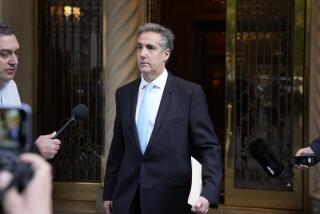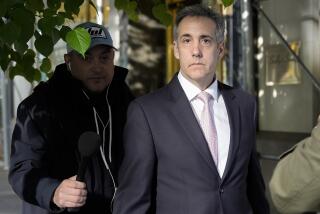Black aide, prosecutor differ on payments
- Share via
CHICAGO — The first of what became a series of payments that grew into the alleged $60-million fraud Conrad Black and his associates are charged with was mapped out at the Canadian company that the former media mogul controlled, prosecutors said Tuesday.
David Radler, Black’s onetime partner who has pleaded guilty, will testify to the creation of the money transfers when he takes the stand as the government’s star witness, said Eric Sussman, the U.S. government’s lead prosecutor.
In an exchange that occurred while the jury was dismissed from the courtroom, Sussman referenced a $2-million payment that came as part of a 1998 sale of two magazines from Black’s onetime global media empire.
Such so-called noncompete payments, nominally promised to guarantee that Black’s company would not reenter a media market it was leaving, should have gone to Hollinger International Inc., the Chicago-based company which ran the media empire, prosecutors said.
The sale of the two magazines was the first of a series of deals of similar noncompete payments. Prosecutors said the payments enriched Black and codefendants Jack Boultbee, Peter Atkinson and Mark Kipnis, instead of going to the company and its shareholders.
Atkinson’s attorneys on Tuesday said their client was being unfairly tied to payments from the 1998 sale because there was no evidence that he was involved. Sussman then said Radler would testify that the decision “came down from Toronto” to send the money to Hollinger Inc., the Canadian firm Black and his aides controlled, which had voting control over Hollinger International.
Defense attorney Benito Romano objected, saying, “There’s no such evidence and there is no witness who will testify to that.”
The jury was then brought back and testimony resumed in the fifth week of the trial.
More to Read
Inside the business of entertainment
The Wide Shot brings you news, analysis and insights on everything from streaming wars to production — and what it all means for the future.
You may occasionally receive promotional content from the Los Angeles Times.










